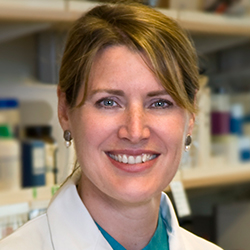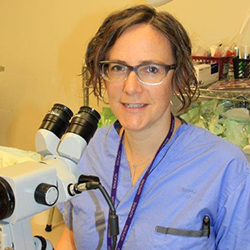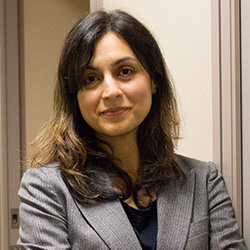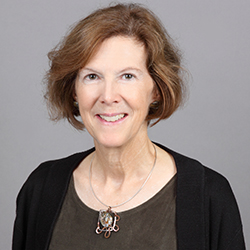In recognition of International Women’s Day on March 8, the UBC Faculty of Medicine is celebrating women in research by speaking with some of our leading researchers in cancer, heart and lung, population health, and brain and chronic disease.
Joanne Matsubara is a UBC Professor in the Department of Ophthalmology and Visual Sciences, who is examining age-related macular degeneration (AMD) – a chronic disease and major cause of blindness among the elderly.
We spoke with Dr. Matsubara about her journey in research, her current projects and what she hopes to accomplish.
What sparked your interest in researching eye disease?
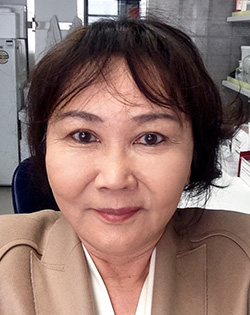
Joanne Matsubara
Focusing on eye disease was quite a leap from what I worked on as a PhD student and as a postdoctoral fellow. However, looking back at my research trajectory I can now see that is was a natural progression.
As a graduate student I worked on a unique “sixth” sense, the electrosensory system in fish. Certain fish in South America and Africa can emit an electric field around their body to “see,” move around, find food and avoid predators.
This work was so new at the time, scientists looked at the organization of other sensory systems (like vision) in order to gain insight and predict how this previously unknown sensory system was wired in the brain. Great puzzle to solve as a graduate student!
This is what led me to study the visual system. The detailed knowledge of how the eye works and how vision is mapped and processed in the brain was so far advanced (compared to the electric sense), that I was immediately drawn in and undertook postdoc studies on the eye and the visual pathways.
What are you working on now?
Today, most of my research is focused on one eye disease – age-related macular degeneration (AMD) – a disease that affects the elderly and a major cause of vision impairment worldwide.
There are two forms of AMD, a “dry” form which accounts for 90 per cent of cases and a “wet” form which accounts for 10 per cent. There are treatments for the wet form but nothing so far for the dry form. Because the dry form is more common, we are focusing on understanding the early biological triggers that kick-start the dry AMD disease process. Our hope is to come up with the essential cellular triggers that, when modified by our experimental drugs, will stop AMD from developing.
We are also working on the very advanced forms of AMD. Using stem cell strategies, we insert replacement cells into the diseased retina. However, this is far trickier than it seems. The replacement cells have to re-wire themselves into the neural circuits of the retina, and then into the brain networks in order for the entire visual system to function normally so that vision/perception is restored.
What advice would you offer women wanting to pursue a career in scientific research?
Research is not an easy road at the moment because of the current funding climate but hopefully things will change. My advice is – pursue your dream job.
If scientific research is your passion, my first piece of advice is to find a mentor and take his/her advice. The mentor needs to be a role model, someone who you can relate to and trust. It’s always helpful to have someone to bounce ideas off of.
Women are great at multi-tasking so my second piece of advice is, once you find your dream job, use your multitasking skills to weave in all the other important parts that make your life worth living. For women in research, life is a juggling act, but it can work if you want it to.
Meet some of our other leading researchers
Marianne Sadar
Marianne Sadar, a UBC Professor in the Department of Pathology and Laboratory Medicine, recently developed an experimental drug that shrinks advanced prostate cancer tumours in the lab. It is the first drug in the world that targets the “engine” of the tumour that causes the cancer to grow.
We caught-up with Dr. Sadar to learn more about her journey into cancer research, her recent drug discovery and the strengths that she feels women bring to the scientific community.
Sheona Mitchell-Foster
Sheona Mitchell-Foster is an Assistant Professor with UBC’s Northern Medical Program based in Prince George, B.C. She is also a practicing obstetrician gynecologist and researcher, who is dedicated to examining cervical cancer prevention and the reproductive health of marginalized and vulnerable populations.
We spoke with Dr. Mitchell-Foster to learn more about what sparked her interest in pursuing a career as a clinician-scientist, her current research projects and what advice she would offer to women wanting to enter the scientific community.
Nadia Khan
Nadia Khan, a UBC Professor of Medicine in the Division of General Internal Medicine, was recently named President of Hypertension Canada. Dr. Khan’s research mainly focuses on cardiovascular disease among specific populations.
We spoke with Dr. Khan about her research interests, what she is working on now and what advice she would offer women wanting to pursue a career in scientific research.
Lynn Raymond
Lynn Raymond is a UBC Professor in the Department of Psychiatry, Clinic Director of the Centre for Huntington Disease, and Director of the UBC MD/PhD Program.
We spoke with Dr. Raymond about her interest in neurology, her current research project and the benefits of pursuing a career in scientific research.
